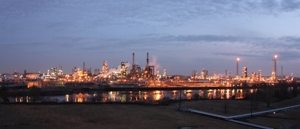E. Coast refiner shuns Bakken delivery as Dakota Access Pipeline starts
NEW YORK (Reuters) -- Philadelphia Energy Solutions Inc, the largest refiner on the US East Coast, will not be taking any rail deliveries of North Dakota's Bakken crude oil in June, a source familiar with delivery schedules said on Tuesday—a sign that the impending start of the Dakota Access Pipeline is upending trade flows.
At its peak, PES would have routinely taken about 3 mi worth of trains filled with Bakken oil each day. But after the $3.8 billion Dakota Access Pipeline begins interstate crude oil delivery on May 14, it will be more lucrative for producers to transport oil to refineries in the US Gulf Coast.
The long-delayed pipeline will provide a boost for Bakken prices and unofficially end the crude-by-rail boom that revived US East Coast refining operations several years ago.
"It's the new reality," said Taylor Robinson, president of PLG Consulting. "Unless there's an unforeseen event, like a supply disruption, there will be no economic incentive to rail Bakken to the East Coast."
PES declined to comment for this story.
The 1,172-mi Dakota Access line runs from western North Dakota to a transfer point in Patoka, Illinois. From there, the 450,000 bpd will connect to large refineries in the Nederland and Port Arthur, Texas, area.
The project became a focus of international attention, drawing protesters from around the world, after a Native American tribe sued to block completion of the final link of the pipeline through a remote part of North Dakota.
The Standing Rock Sioux tribe said the pipeline would desecrate a sacred burial ground and that any oil leak would poison the tribe's water supply.
But after US President Donald Trump took office in January, one of his first acts was to sign an executive order that reversed a decision by the Obama administration to delay approval of the pipeline. The tribe also lost several lawsuits aimed at stopping the project led by Energy Transfer Partners LP.
PES has scheduled just five rail deliveries of crude for May and none for June at its facility in Philadelphia, according to the source familiar with the plant's operations, who spoke on condition of anonymity because they are not authorized to speak about company operations. Deliveries are often scheduled months in advance to manage logistics like storage and manpower.
In recent months, PES was getting roughly one unit train per day, the equivalent of 75,000 bpd. During the boom years between 2013 and 2015, PES would routinely receive three trains a day of Bakken.
PES and other refiners built large rail terminals on the East Coast in recent years to accommodate cheap Bakken flowing from North Dakota. The PES refinery terminal, which opened in 2013, was able to handle roughly 280,000 bpd, making it the largest on the US East Coast.
Rail volumes of Bakken crude peaked at 420,000 bpd, resulting in bumper profits for those refiners. But Bakken crude's discount to US crude slowly eroded as pipeline capacity out of North Dakota expanded, increasing competition for the heavy oil.
That forced the East Coast to rely more heavily on foreign, waterborne crude. Currently, Bakken barrels at the delivery point in Nederland, Texas, in June are trading around $1.25 to $1.50 a barrel over US crude futures. Higher rail costs would boost those barrels to $7 to $8 more than US crude.
The East Coast has averaged roughly 100,000 bpd of crude rail deliveries in recent weeks, according to energy industry intelligence service Genscape.
Monroe Energy, a subsidiary of Delta Air Lines, stopped receiving Bakken by rail for its 185,000-bpd refinery outside Philadelphia in January of last year. East Coast refineries operated by Phillips 66 and PBF Energy are still receiving modest volumes of Bakken crude. "At this point, there are no good reasons to rail crude to the East Coast," said Sarah Emerson, a managing principal at ESAI Energy LLC, a consultancy.
Reporting by Jarrett Renshaw; Additional reporting by Catherine Ngai in New York; Editing by Matthew Lewis







Comments